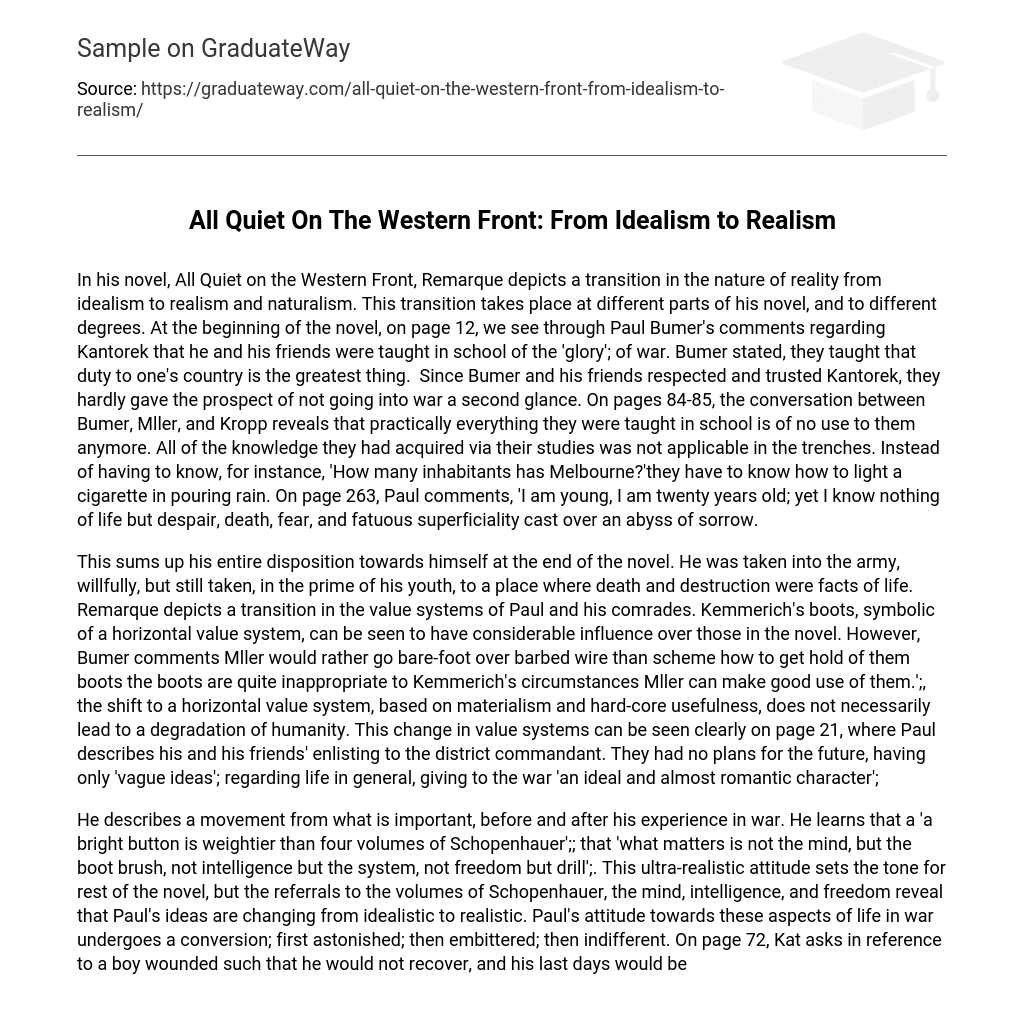In his novel, All Quiet on the Western Front, Remarque depicts a transition in the nature of reality from idealism to realism and naturalism. This transition takes place at different parts of his novel, and to different degrees. At the beginning of the novel, on page 12, we see through Paul Bumer’s comments regarding Kantorek that he and his friends were taught in school of the ‘glory’; of war. Bumer stated, they taught that duty to one’s country is the greatest thing. Since Bumer and his friends respected and trusted Kantorek, they hardly gave the prospect of not going into war a second glance. On pages 84-85, the conversation between Bumer, Mller, and Kropp reveals that practically everything they were taught in school is of no use to them anymore. All of the knowledge they had acquired via their studies was not applicable in the trenches. Instead of having to know, for instance, ‘How many inhabitants has Melbourne?’they have to know how to light a cigarette in pouring rain. On page 263, Paul comments, ‘I am young, I am twenty years old; yet I know nothing of life but despair, death, fear, and fatuous superficiality cast over an abyss of sorrow.
This sums up his entire disposition towards himself at the end of the novel. He was taken into the army, willfully, but still taken, in the prime of his youth, to a place where death and destruction were facts of life. Remarque depicts a transition in the value systems of Paul and his comrades. Kemmerich’s boots, symbolic of a horizontal value system, can be seen to have considerable influence over those in the novel. However, Bumer comments Mller would rather go bare-foot over barbed wire than scheme how to get hold of them boots the boots are quite inappropriate to Kemmerich’s circumstances Mller can make good use of them.’;, the shift to a horizontal value system, based on materialism and hard-core usefulness, does not necessarily lead to a degradation of humanity. This change in value systems can be seen clearly on page 21, where Paul describes his and his friends’ enlisting to the district commandant. They had no plans for the future, having only ‘vague ideas’; regarding life in general, giving to the war ‘an ideal and almost romantic character’;
He describes a movement from what is important, before and after his experience in war. He learns that a ‘a bright button is weightier than four volumes of Schopenhauer’;; that ‘what matters is not the mind, but the boot brush, not intelligence but the system, not freedom but drill’;. This ultra-realistic attitude sets the tone for rest of the novel, but the referrals to the volumes of Schopenhauer, the mind, intelligence, and freedom reveal that Paul’s ideas are changing from idealistic to realistic. Paul’s attitude towards these aspects of life in war undergoes a conversion; first astonished; then embittered; then indifferent. On page 72, Kat asks in reference to a boy wounded such that he would not recover, and his last days would be spent in anguish, ‘Shouldn’t we just take a revolver and put an end to it.
This shows a very high degree of realism, but although the transition of reality from idealism to realism is in full swing at this particular point in the novel, Paul and Kat cannot bring themselves to put the boy out of his misery. This shows that although the transition is occurring continuously throughout the novel, humanity and their own morals and ethics have not completely disappeared. A different aspect of the transition, from idealism to naturalism, can be seen first on pages 7-8, where Paul recounts ‘how embarrassed we were as recruits;#8230;when we had to use the general latrine’. This reveals a movement towards naturalism, as we witness Paul and his friends complete their business out in the open in ‘square, neat boxes’;
This theme is demonstrated again on pages 265-66 when Lewandowski’s wife, Marja, comes to visit him, and they have sex, as the rest of the men play skat. This movement, as the previous, shows that the men are closer to nature, and to themselves, as a result of the war. Paul declares on page 122, ‘We could never regain the old intimacy with those senses of youth. Perhaps we recognized no limits and saw nowhere an end.’
This idealistic impression of his youth is not only consistent with the rest of the novel, but it reveals that he himself understands what is happening to him. His reality during the war was completely opposite his reality before the war, and would have been completely different from the reality he’d have experienced after the war, had he not been killed. Everything he experienced during the war was not applicable to normal life, but neither was anything he had learned in real life applicable to war. This mutual exclusiveness threw Paul’s world upside-down, and the transition of his reality from idealism to realism and naturalism was only the final result. His shift in value systems from vertical to horizontal was yet another testament to this theory. In conclusion, it has been proven that in his novel, All Quiet on the Western Front, Erich Remarque depicts a transition in the nature of reality from idealism to realism and naturalism.





